- Home
- William Kennedy
Ironweed (1984 Pulitzer Prize) Page 2
Ironweed (1984 Pulitzer Prize) Read online
Page 2
“Hey,” Rudy said, “wasn’t you with a woman the other night I saw you?”
“What woman?”
“I don’t know. Helen. Yeah, you called her Helen.”
“Helen. You can’t keep track of where she is.”
“What’d she do, run off with a banker?”
“She didn’t run off.”
“Then where is she?”
“Who knows? She comes, she goes. I don’t keep tabs.”
“You got a million of ‘em.”
“More where she came from.”
“They’re all crazy to meet you.”
“My socks is what gets ‘em.”
Francis lifted his trousers to reveal his socks, one green, one blue.
“A reg’lar man about town,” Rudy said.
Francis dropped his pantlegs and walked on, and Rudy said, “Hey, what the hell was all that about the man from Mars last night? Everybody was talkin’ about it at the hospital. You hear about that stuff on the radio?”
“Oh yeah. They landed.”
“Who?”
“The Martians.”
“Where’d they land?”
“Someplace in Jersey.”
“What happened?”
“They didn’t like it no more’n I did.”
“No joke,” Rudy said. “I heard people saw them Martians comin’ and ran outa town, jumped outa windows, everything like that.”
“Good,” Francis said. “What they oughta do. Anybody sees a Martian oughta jump out two windows.”
“You don’t take things serious,” Rudy said. “You have a whatayacallit, a frivolous way about you.”
“A frivolous way? A frivolous way?”
“That’s what I said. A frivolous way.”
“What the hell’s that mean? You been readin’ again, you crazy kraut? I told you cuckoos like you shouldn’t go around readin’, callin’ people frivolous.”
“That ain’t no insult. Frivolous is a good word. A nice word.”
“Never mind words, there’s the cemetery.” And Francis pointed to the entrance-road gates. “I just thought of somethin’.”
“What?”
“That cemetery’s full of gravestones.”
“Right.”
“I never knew a bum yet had a gravestone.”
They walked up the long entrance road from Broadway to the cemetery proper. Francis sweet-talked the woman at the gatehouse and mentioned Marcus Gorman and introduced Rudy as a good worker like himself, ready to work. She said the truck’d be along and to just wait easy. Then he and Rudy rode up in the back of the truck and got busy with the dirt.
They rested when they’d filled in all the hollows of the graves, and by then the truck driver was nowhere to be found. So they sat there and looked down the hill toward Broadway and over toward the hills of Rensselaer and Troy on the other side of the Hudson, the coke plant spewing palpable smoke from its great chimney at the far end of the Menands bridge. Francis decided this would be a fine place to be buried. The hill had a nice flow to it that carried you down the grass and out onto the river, and then across the water and up through the trees on the far shore to the top of the hills, all in one swoop. Being dead here would situate a man in place and time. It would give a man neighbors, even some of them really old folks, like those antique dead ones at the foot of the lawn: Tobias Banion, Elisha Skinner, Elsie Whipple, all crumbling under their limestone headstones from which the snows, sands, and acids of reduction were slowly removing their names. But what did the perpetuation of names matter? Ah well, there were those for whom death, like life, would always be a burden of eminence. The progeny of those growing nameless at the foot of the hill were ensured a more durable memory. Their new, and heavier, marble stones higher up on the slope had been cut doubly deep so their names would remain visible for an eternity, at least.
And then there was Arthur T. Grogan.
The Grogan Parthenon reminded Francis of something, but he could not say what. He stared at it and wondered, apart from its size, what it signified. He knew nothing of the Acropolis, and little more about Grogan except that he was a rich and powerful Albany Irishman whose name everybody used to know. Francis could not suppose that such massive marbling of old bones was a sweet conflation of ancient culture, modern coin, and self-apotheosizing. To him, the Grogan sepulcher was large enough to hold the bodies of dozens. And as this thought grazed his memory he envisioned the grave of Strawberry Bill Benson in Brooklyn. And that was it. Yes. Strawberry Bill had played left field for Toronto in ought eight when Francis played third, and when Francis hit the road in ‘16 after Gerald died, they bumped into each other at a crossroads near Newburgh and caught a freight south together.
Bill coughed and died a week after they reached the city, cursing his too-short life and swearing Francis to the task of following his body to the cemetery. “I don’t want to go out there all by myself,” Strawberry Bill said. He had no money, and so his coffin was a box of slapsided boards and a few dozen tenpenny nails, which Francis rode with to the burial plot. When the city driver and his helper left Bill’s pile of wood sitting on top of some large planks and drove off, Francis stood by the box, letting Bill get used to the neighborhood. “Not a bad place, old buddy. Couple of trees over there.” The sun then bloomed behind Francis, sending sunshine into an opening between two of the planks and lighting up a cavity below. The vision stunned Francis: a great empty chasm with a dozen other coffins of crude design, similar to Bill’s, piled atop one another, some on their sides, one on its end. Enough earth had been dug away to accommodate thirty or forty more such crates of the dead. In a few weeks they’d all be stacked like cordwood, packaged cookies for the great maw. “You ain’t got no worries now, Bill,” Francis told his pal. “Plenty of company down there. You’ll be lucky you get any sleep at all with them goin’s on.”
Francis did not want to be buried like Strawberry Bill, in a tenement grave. But he didn’t want to rattle around in a marble temple the size of the public bath either.
“I wouldn’t mind bein’ buried right here,” Francis told Rudy.
“You from around here?”
“Used to be. Born here.”
“Your family here?”
“Some.”
“Who’s that?”
“You keep askin’ questions about me, I’m gonna give you a handful of answers.”
Francis recognized the hill where his family was buried, for it was just over from the sword-bearing guardian angel who stood on tiptoe atop three marble steps, guarding the grave of Toby, the dwarf who died heroically in the Delavan Hotel fire of ‘94. Old Ed Daugherty, the writer, bought that monument for Toby when it came out in the paper that Toby’s grave had no marker. Toby’s angel pointed down the hill toward Michael Phelan’s grave and Francis found it with his gaze. His mother would be alongside the old man, probably with her back to him. Fishwife.
The sun that bloomed for Strawberry Bill had bloomed also on the day Michael Phelan was buried. Francis wept out of control that day, for he had been there when the train knocked Michael fifty feet in a fatal arc; and the memory tortured him. Francis was bringing him his hot lunch in the lunch pail, and when Michael saw Francis coming, he moved toward him. He safely passed the switch engine that was moving slowly on the far track, and then he turned his back, looked the way he’d just come, and walked backward, right into the path of the northbound train whose approach noise was being blocked out by the switch engine’s clatter. He flew and then fell in a broken pile, and Francis ran to him, the first at his side. Francis looked for a way to straighten the angular body but feared any move, and so he pulled off his own sweater and pillowed his father’s head with it. So many people go crooked when they die.
A few of the track gang followed Michael home in the back of Johnny Cody’s wagon. He lingered two weeks and then won great obituaries as the most popular track foreman, boss gandy dancer, on the New York Central line. The railroad gave all track workers on the Al
bany division the morning off to go to the funeral, and hundreds came to say so long to old Mike when he rode up here to live. Queen Mama ruled the house alone then, until she joined him in the grave. What I should do, Francis thought, is shovel open the grave, crawl down in there, and strangle her bones. He remembered the tears he cried when he stood alongside the open grave of his father and he realized then that one of these days there would be nobody alive to remember that he cried that morning, just as there is no proof now that anyone over cried for Tobias or Elisha or Elsie at the foot of the hill. No trace of grief is left, abstractions taken first by the snows of reduction.
“It’s okay with me if I don’t have no headstone,” Francis said to Rudy, “just so’s I don’t die alone.”
“You die before me I’ll send out invites,” Rudy said.
Kathryn Phelan, suddenly aware her worthless son was accepting his own death, provided it arrived on a gregarious note, humphed and fumed her disapproval to her husband. But Michael Phelan was already following the line of his son’s walk toward the plot beneath the box elder tree where Gerald was buried. It always amazed Michael that the living could move instinctually toward dead kin without foreknowledge of their location. Francis had never seen Gerald’s grave, had not attended Gerald’s funeral. His absence that day was the scandal of the resident population of Saint Agnes’s. But here he was now, walking purposefully, and with a slight limp Michael had not seen before, closing the gap between father and son, between sudden death and enduring guilt. Michael signaled to his neighbors that an act of regeneration seemed to be in process, and the eyes of the dead, witnesses all to their own historical omissions, their own unbridgeable chasms in life gone, silently rooted for Francis as he walked up the slope toward the box elder. Rudy followed his pal at a respectful distance, aware that some event of moment was taking place. Hangdog, he observed.
In his grave, a cruciformed circle, Gerald watched the advent of his father and considered what action might be appropriate to their meeting. Should he absolve the man of all guilt, not for the dropping, for that was accidental, but for the abandonment of the family, for craven flight when the steadfast virtues were called for? Gerald’s grave trembled with superb possibility. Denied speech in life, having died with only monosyllabic goos and gaahs in his vocabulary, Gerald possessed the gift of tongues in death. His ability to communicate and to understand was at the genius level among the dead. He could speak with any resident adult in any language, but more notable was his ability to understand the chattery squirrels and chipmunks, the silent signals of the ants and beetles, and the slithy semaphores of the slugs and worms that moved above and through his earth. He could read the waning flow of energy in the leaves and berries as they fell from the box elder above him. And because his fate had been innocence and denial, Gerald had grown a protective web which deflected all moisture, all moles, rabbits, and other burrowing creatures. His web was woven of strands of vivid silver, an enveloping hammock of intricate, neartransparent weave. His body had not only been absolved of the need to decay, but in some respects—a full head of hair, for instance—it had grown to a completeness that was both natural and miraculous. Gerald rested in his infantile sublimity, exuding a high gloss induced by early death, his skin a radiant white-gold, his nails a silvery gray, his cluster of curls and large eyes perfectly matched in gleaming ebony. Swaddled in his grave, he was beyond capture by visual or verbal artistry. He was neither beautiful nor perfect to the beholder but rather an ineffably fabulous presence whose like was not to be found anywhere in the cemetery, and it abounded with dead innocents.
Francis found the grave without a search. He stood over it and reconstructed the moment when the child was slipping through his fingers into death. He prayed for a repeal of time so that he might hang himself in the coal bin before picking up the child to change his diaper. Denied that, he prayed for his son’s eternal peace in the grave. It was true the boy had not suffered at all in his short life, and he had died too quickly of a cracked neckbone to have felt pain: a sudden twist and it was over. Gerald Michael Phelan, his gravestone said, born April 13, 1916, died April 26, 1916. Born on the 13th, lived 13 days. An unlucky child who was much loved.
Tears oozed from Francis’s eyes, and when one of them fell onto his shoetop, he pitched forward onto the grave, clutching the grass, remembering the diaper in his grip. It had smelled of Gerald’s pungent water, and when he squeezed it with his horrified right hand, a drop of the sacred fluid fell onto his shoetop. Twenty-two years gone, and Francis could now, in panoramic memory, see, hear, and feel every detail of that day, from the time he left the carbarns after work, to his talk about baseball with Bunt Dunn in King Brady’s saloon, and even to the walk home with Cap Lawlor, who said Brady’s beer was getting a heavy taste to it and Brady ought to clean his pipes, and that the Taylor kid next door to the Lawlors was passing green pinworms. His memory had begun returning forgotten images when it equated Arthur T. Grogan and Strawberry Bill, but now memory was as vivid as eyesight.
“I remember everything,” Francis told Gerald in the grave. “It’s the first time I tried to think of those things since you died. I had four beers after work that day. It wasn’t because I was drunk that I dropped you. Four beers, and I didn’t finish the fourth. Left it next to the pigs’-feet jar on Brady’s bar so’s I could walk home with Cap Lawlor. Billy was nine then. He knew you were gone before Peggy knew. She hadn’t come home from choir practice yet. Your mother said two words, ‘Sweet Jesus,’ and then we both crouched down to snatch you up. But we both stopped in that crouch because of the looks of you. Billy come in then and saw you. ‘Why is Gerald crooked?’ he says. You know, I saw Billy a week or so ago and the kid looks good. He wanted to buy me new clothes. Bailed me outa jail and even give me a wad of cash. We talked about you. He says your mother never blamed me for dropping you. Never told a soul in twenty-two years it was me let you fall. Is that some woman or isn’t it? I remember the linoleum you fell on was yellow with red squares. You suppose now that I can remember this stuff out in the open, I can finally start to forget it?”
Gerald, through an act of silent will, imposed on his father the pressing obligation to perform his final acts of expiation for abandoning the family. You will not know, the child silently said, what these acts are until you have performed them all. And after you have performed them you will not understand that they were expiatory any more than you have understood all the other expiation that has kept you in such prolonged humiliation. Then, when these final acts are complete, you will stop trying to die because of me.
Francis stopped crying and tried to suck a small piece of bread out from between the last two molars in his all but toothless mouth. He made a slurping sound with his tongue, and when he did, a squirrel scratching the earth for food to store up for the winter spiraled up the box elder in sudden fright. Francis took this as a signal to conclude his visit and he turned his gaze toward the sky. A vast stand of white fleece, brutally bright, moved south to north in the eastern vault of the heavens, a rush of splendid wool to warm the day. The breeze had grown temperate and the sun was rising to the noonday pitch. Francis was no longer chilly.
“Hey bum,” he called to Rudy. “Let’s find that truck driver.”
“Whatayou been up to?” Rudy asked. “You know somebody buried up there?”
“A little kid I used to know.”
“A kid? What’d he do, die young?”
“Pretty young.”
“What happened to him?”
“He fell.”
“He fell where?”
“He fell on the floor.”
“Hell, I fall on the floor about twice a day and I ain’t dead.”
“That’s what you think,” Francis said.
II
They rode the Albany-Troy-via-Watervliet bus downtown from the cemetery. Francis told Rudy: “Spend a dime, ya bum,” and they stepped up into the flat-faced, red-and-cream window box on wheels, streamline in design but wit
hout the spark of electric life, without the rockinghorse comfort, or the flair, or the verve, of the vanishing trolley. Francis remembered trolleys as intimately as he remembered the shape of his father’s face, for he had seen them at loving closeness through all his early years. Trolleys dominated his life the way trains had dominated his father’s. He had worked on them at the North Albany carbarns for years, could take them apart in the dark. He’d even killed a man over them in 1901 during the trolley strike. Terrific machines, but now they’re goin’.
“Where we headed?” Rudy asked.
“What do you care where we’re headed? You got an appointment? You got tickets for the opera?”
“No, I just like to know where I’m goin’.”
“You ain’t knowed where you was goin’ for twenty years.”
“You got somethin’ there,” Rudy said.
“We’re goin’ to the mission, see what’s happenin’, see if anybody knows where Helen is.”
“What’s Helen’s name?”
“Helen.”
“I mean her other name.”
“Whatayou want to know for?”
“I like to know people’s names.”

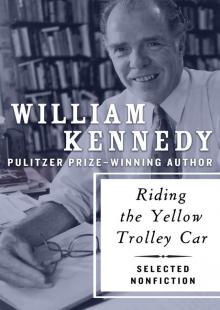 Riding the Yellow Trolley Car: Selected Nonfiction
Riding the Yellow Trolley Car: Selected Nonfiction Changó's Beads and Two-Tone Shoes
Changó's Beads and Two-Tone Shoes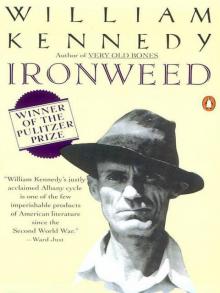 Ironweed
Ironweed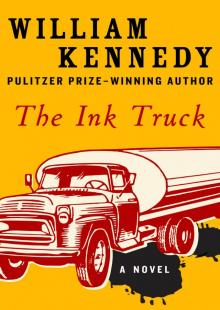 The Ink Truck
The Ink Truck Billy Phelan's Greatest Game
Billy Phelan's Greatest Game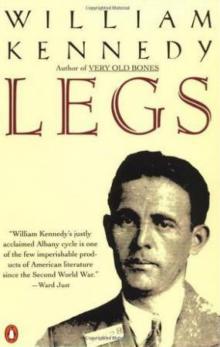 Legs
Legs Very Old Bones
Very Old Bones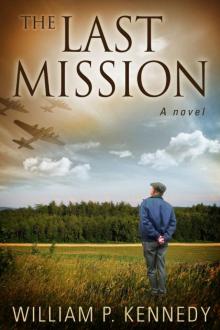 The Last Mission
The Last Mission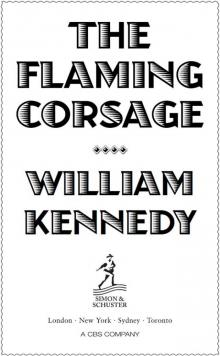 The Flaming Corsage
The Flaming Corsage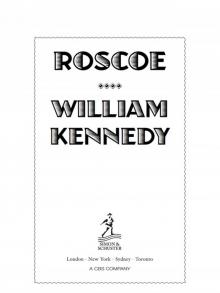 Roscoe
Roscoe Quinn's Book
Quinn's Book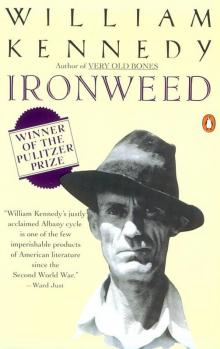 Ironweed (1984 Pulitzer Prize)
Ironweed (1984 Pulitzer Prize)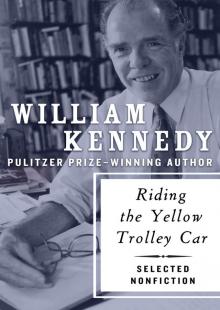 Riding the Yellow Trolley Car
Riding the Yellow Trolley Car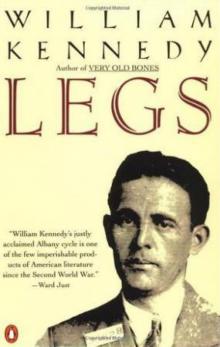 Legs - William Kennedy
Legs - William Kennedy